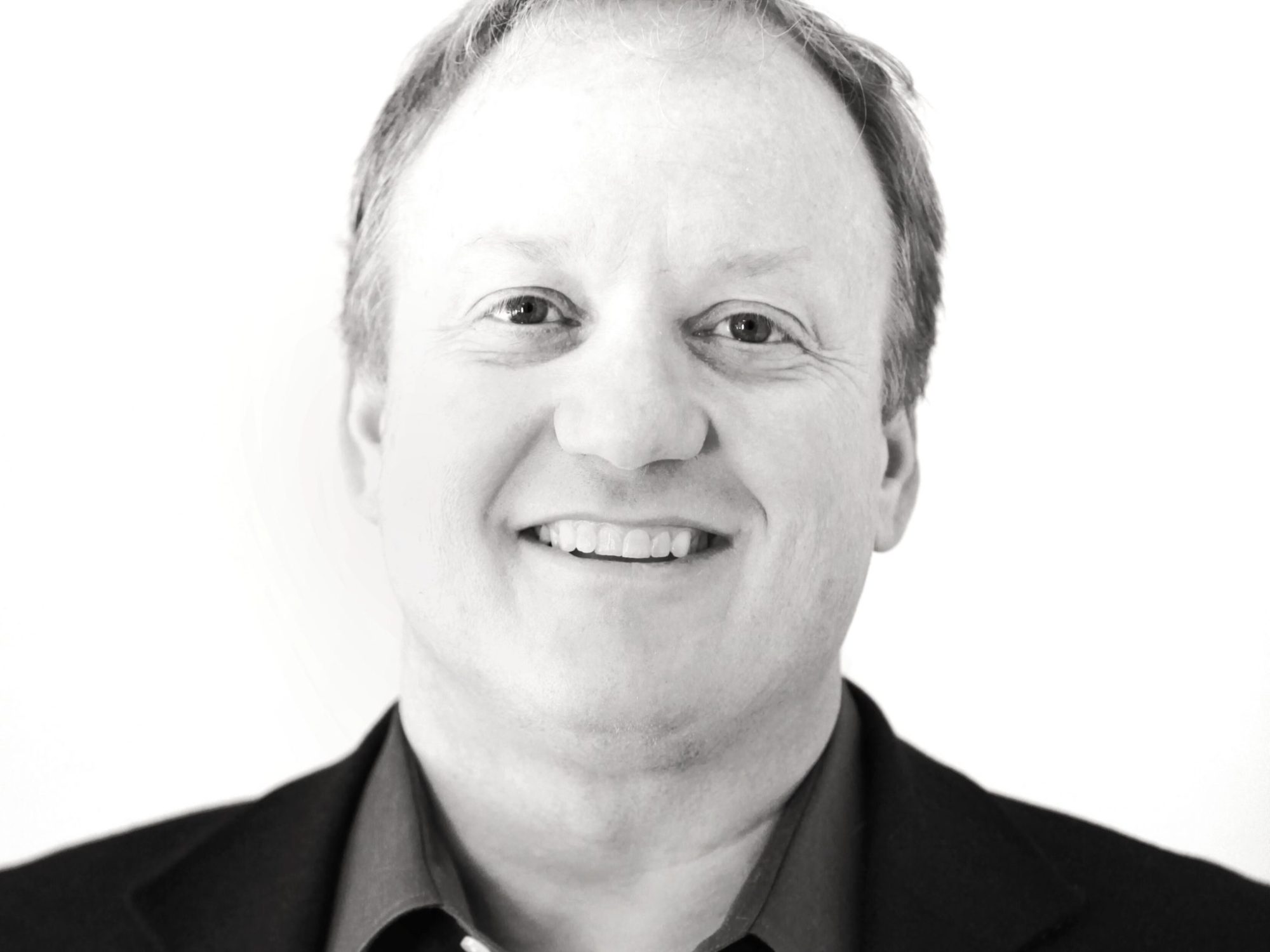Humans have battled crises throughout history and often come out the other side stronger. Whether it was wars, famine, plagues or natural disasters, humans are a resilient bunch. With the COVID crisis continuing to build momentum in terms of physical heath, mental health and financial challenges, our collective resiliency is being tested. From the latest IMI data, we see that the estimated end date for COVID continues to extend. This means that the perceived end is not quite yet in sight.
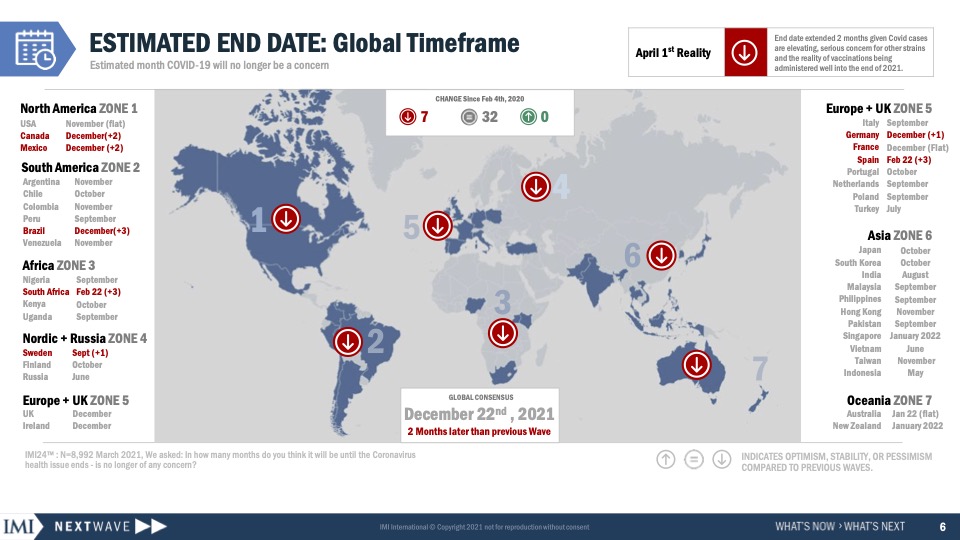
While much of the conversation to date has been about the “bad news” (infection rates, deaths and impacted communities), there is more to the story. And that is what our expert contributor has explored his entire career. Don Mayo is the Managing Partner, Global, of IMI International, a research-based consultancy. IMI has been peeling the onion to discover new truths for half a century. Due to the unique approach that IMI has created, it’s worthwhile to explore how this team works.
A Method to the Madness
IMI International started 2020 celebrating its 50th year in business. During this time, IMI has been conducting and analyzing research to gain and share insights. Don started as an intern back in 1986 while he was in university and this has been his one job. Today, Don and his team provides solutions for companies around the world. Organizations globally have issues, questions or opportunities and they want consumer or customer feedback or input.
Companies ask regularly: “how do my consumers / brands / campaigns work?” And therefore, “how do we go to market?” IMI looks at what information is necessary to make a sound business decision. Conducting research in 45 countries and on four continents, IMI works with nearly 200 companies per year globally. Their focus is to deliver insights that drive profit because the world is filled with way too much data. Don believes there is also too much research done to ‘check the box’ so there’s too much noise in the data.
IMI’s focus is around exploring: “Do you have a question?” or “What decision are you trying to make?” At that point, Don’s team will present an approach to find a solution to confirm or refute what you’re thinking. Or, it’s how to optimize how to work forward in a solutions-focused manner.
People SAY a lot of things and INTEND to do a lot of things but they often don’t DO them.
Don understands there’s a lot of science, blended with art, in this type of exploration. The key insight anyone can take away is past behaviour dictates future behaviour. A common area that demonstrates the importance of understanding behavior vs. intention is weight loss. Over the past 20 year, over 70% have said ‘I intend to lose weight in the next 12 months.’ However, these same people have NOT worked out in the last week and ate fast food three times. The reality is that the behaviour of inactivity and poor eating habits eliminates the attitude of ‘intending to lose weight.’ Don explains you must understand and appreciate attitudes, but focus laser attention on behaviours when studying any topic.
Not So Uncharted Territory
As a result of Don’s lifetime of professional experience, he has seen three significant economic downturns. There’s been nothing close to this but Don notes society and the economy have bounced through significant downturns before.
During every economic downturn, everyone stalls and is paralyzed by the unknown.
And the unknown is created by uncertainty. What do leaders do? The CFOs of companies lock down all money – which they need to – to make sure people survive. To support insights-based decision making for leaders in 2008, IMI launched a series called Turbulent Times. That was during a time when IMI’s revenues got crushed. Despite that, IMI invested their own money to provide guidance to clients. Back in 2008, the auto market was down 40%. Today, the restaurant industry is down 80%, travel down 95% and uncertainty is the only certainty.
Starting in February 2020, thinking COVID was going to last three months, IMI’s NextWave™ launched a series of studies. The goal is to again provide perspective and context for both their clients and the wider business community.
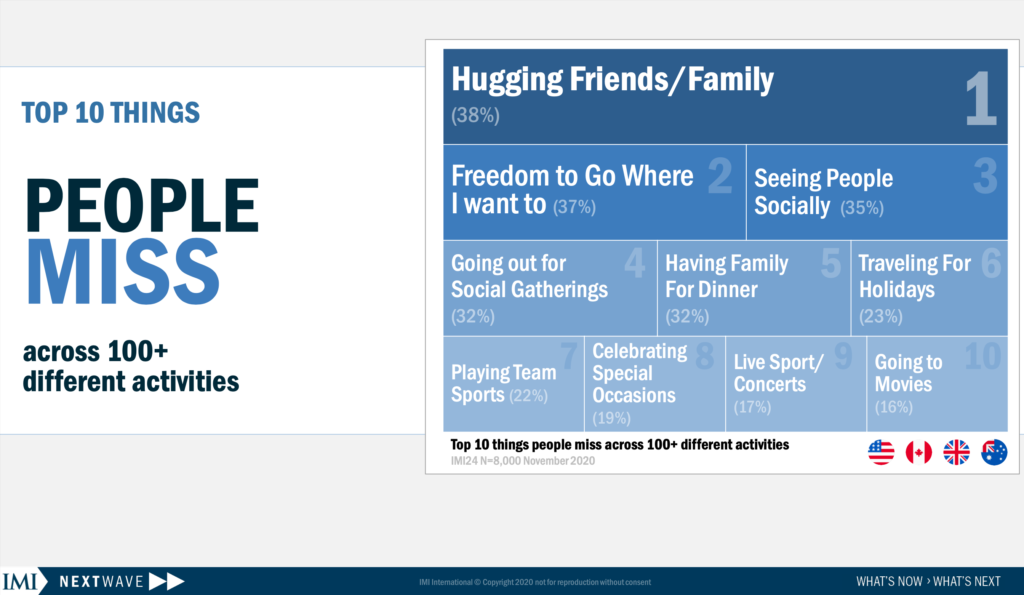
Well over one million interviews across 39 countries have been completed globally since the start of COVID.
IMI continues to provide fact-based insight on consumer thoughts, perceptions, fears, actions and behaviours, so that companies can actually make decisions based on facts. Having seen this before, Don recognizes that what happens when there’s uncertainty is it gives a chance for those people who are negative or who might have a conflict of interest to voice their ill-informed opinions. Dangerously, these opinions can steamroll facts. IMI’s goal is to remove economic fear while respecting there is a legitimate health fear right now. All leaders need facts – not personal opinions, perceptions or politics – right now to guide their planning into the future.
The Media’s Impact During COVID
As Don sees it, news is no longer about journalism. It’s about sensationalism. We hear every day how many cases and deaths there are and it’s always “the worst it’s been.” This is accomplished by presenting cumulative totals, while not giving the same attention to recovered cases. Or members of the media will create a headline that shows a huge jump in numbers with the disclaimer buried in the article that those numbers are for the weekend, and therefore not a daily total.
Today, 80% of people are concerned about their personal health. Don has never seen consensus like this in 50 years.
60% are concerned about financial health. Governments are throwing money at this issue – and global leaders have largely addressed the risk of a Depression-type economic collapse – but it has been extremely expensive. But the economic strain is just one piece of the puzzle. Mental health and societal strain are apparent in many ways, but because the economy is receiving the most amount of attention, other realities are not getting addressed.
A Mental Health Crisis is Hiding in Plain Sight
As part of IMI’s NextWave™ series, Don’s team asked a simple, unaided question to probe the mental health status of respondents. It asked what words describe your emotions from last week. The most common words – from half of respondents – were sad, tired, stressed, bored and angry. Typically, 20% of the population might be feeling that way emotionally. That’s a big jump of a concerning metric and it’s something that can’t be seen.
Since mental health is often invisible, it’s easy to pay lip service to it but we know it’s harder to actually address it.
From pouring over the data, Don sees that alleviating some of the mental health stress involves getting children back in school. That has not been without its challenges or gaps but it’s better for students, parents and employers than a purely online approach to education.
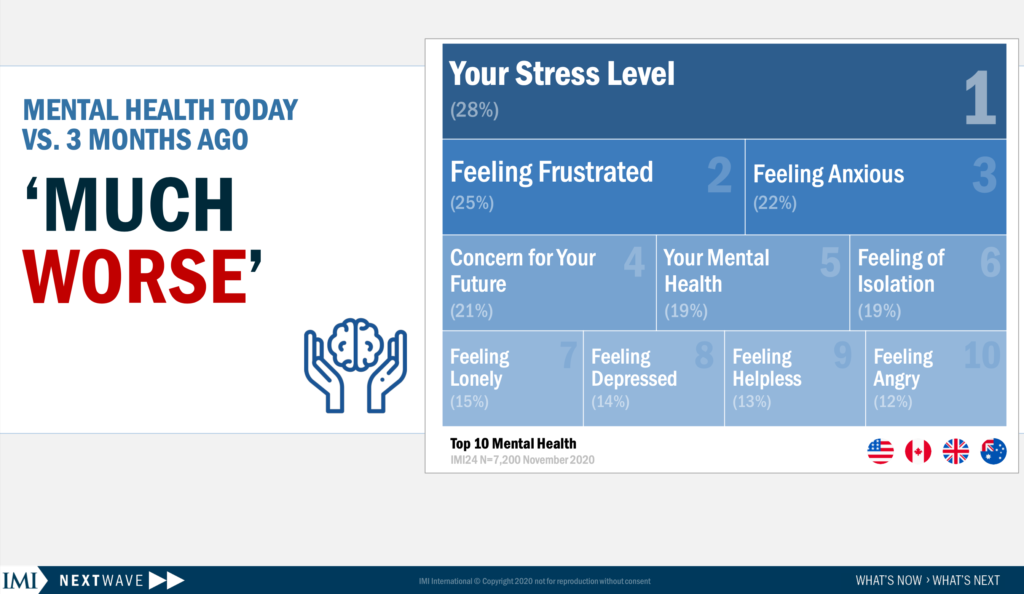
Asking another simple question again yielded interesting results. “What’s much worse now than three months ago (July 2020)?” Seven million Canadians said their stress level is much worse. Six million Canadians said they’re feeling frustrated and anxious. And 5 million Canadians said they felt isolated, lonely, depressed, helpless and angry much worse now than three months ago. Don recalls that July was not a great month so to see another big drop since then, that’s concerning.
The perception of Canadians is that things are getting much much worse. Plus, it will be months more until vaccines are widely deployed.
The big question that Don asks as a result of his team’s investigations is clear. What are we going to do about that feeling of stress, frustration, anxiousness, isolation, loneliness and depression as vaccines are rolled out? If a person is in a depressed state, it’s going take a long time to get back out of that, even when the immediate COVID concern passes. This issue is hiding in plain sight, but Don doesn’t see the governments focusing on this key reality, which may get much worse, before any improvements are made.
Physical Health Impacts Due to Lockdowns
IMI explored eating and food habits because mental health often goes hand in hand with such activity. In addition, Don’s team explored physical health as gyms have been closed, often leading to less exercise for people.
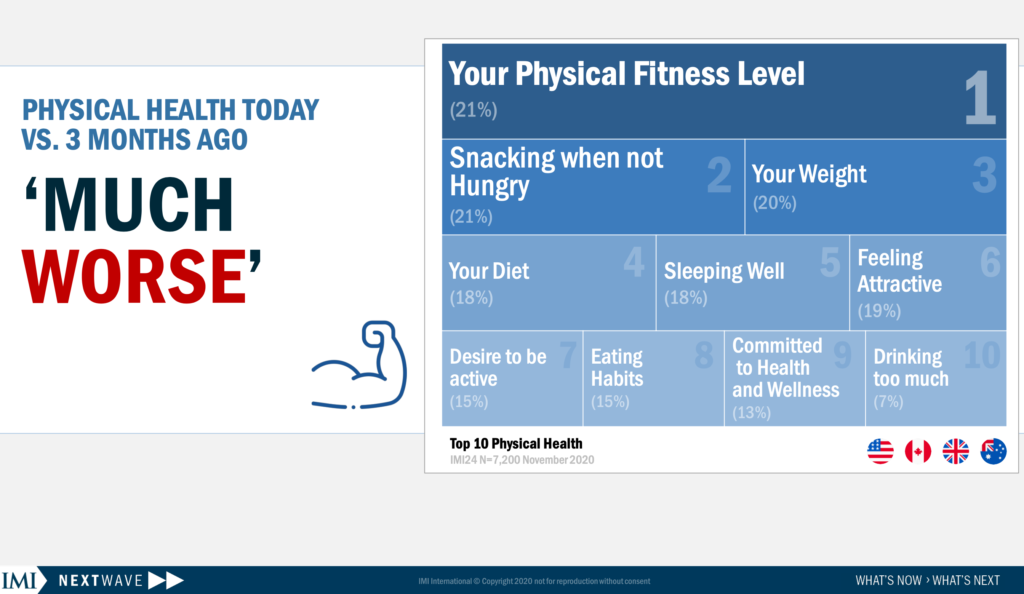
Five to six million Canadians are feeling much worse about their fitness and weight level than three months ago. Six million are snacking even when they’re not hungry. Five million people are not sleeping well. Four and a half million people are not feeling attractive. Such inactivity and lower quality diets are not going to help the obesity epidemic. Not sleeping well is a massive factor in long term mental health.
This is a perfect storm – for the first time ever – of visible personal and financial health concerns and invisible mental health deterioration for a majority of Canadians.
Layer in attitudinally people feeling terrible physically and mentally. Don hopes he’s not right here but there may be no greater health dilemma than what we’re experiencing now. He believes that we are all experiencing a virus, created by the COVID virus, that could have long-lasting, societal-wide impacts that could actually be bigger than the impacts of COVID itself.
Solutions to The World’s Biggest Problems
Looking back in history to other health crises, Don sees clearly that what we need to do now is collaborate. It’s not a liberal or conservative issue. Nor is it a federal or provincial issue. It’s not a business or health or tech issue. It’s a time for humanity – for everyone – to rally together, whether it’s distancing, wearing masks or investing in the right areas to address the broader impact of the virus. Humanity seems to be in short supply right now and Don believes it’s what is needed most.
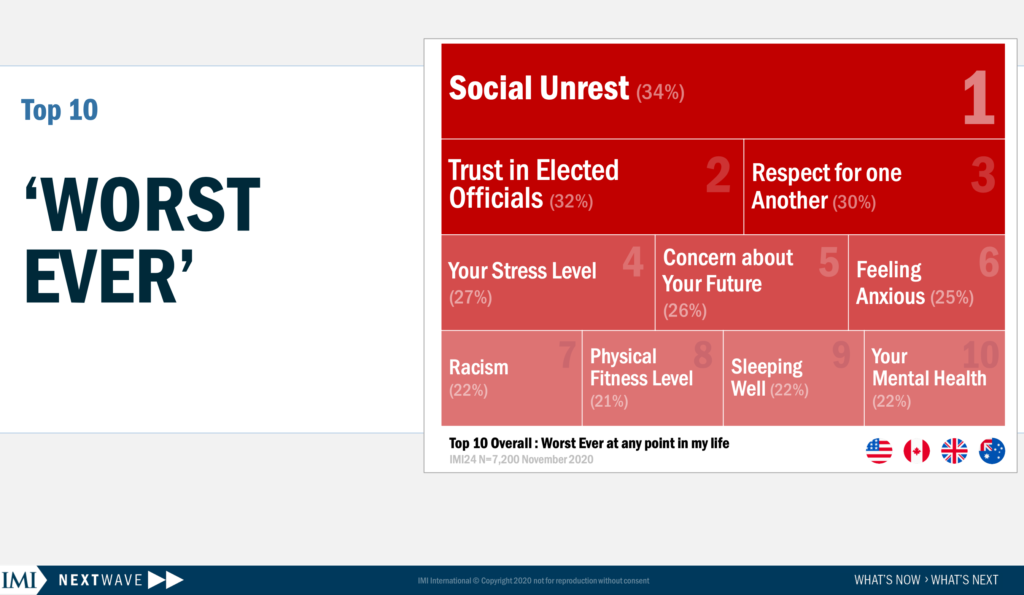
1 in 3 in North America agree that ‘respect for one another’ is currently at the worst point at any point in their life.
There’s far too little respect, humanity or patience with others right now. Therefore, Don believes we all need leadership by example. Whether it’s politicians, sports figures or others, we all need to be open to, listen to, accepting of and sharing facts.
Don shares that consumers’ agree that one of the good things that have come over the past year is people wanting to deal with Social Unrest and the Black Lives Matter movement. The NBA kneeling down during anthems, the renaming of the Washington Football Team or the pulling of sponsorships due to social injustice inaction. The social injustice awareness at the same time as COVID is one of the good things to be at the forefront. Building a culture and expectation of respect for all is the type of thing that Don thinks is a positive that will stay relevant going forward.
Five Glimmers of Hope for Mental Health
The other positives that Don’s team sees coming from this were a bit surprising. Noting the long term confinement of people in proximity with those in their households, four million Canadians are seeing improved satisfaction with their families. This togetherness has actually got us away from the insanity of life and actually understand what the most important thing is in life – family. So that’s a really positive thing.
The second thing is, even with the downside of physical health, we also see some people that have a renewed commitment to health and wellness. Plus, there’s an increase in available time for it. So, while this group is not as big as the downside, there are some people that actually have found a new zest for exercise.
Third, and coupled with the above – since we know exercise reduces stress levels – is that some people are feeling less stress now. This is because of eliminated commutes, more family time and a lack of programming for children (to be driven to / fundraised for / social challenges of).
Fourth, many people are realizing now that they’ve never had a major, critical situation during their lives before. So Don believes they might be a little more resilient going forward. And that’s helpful for whatever less severe lifestyle shocks may be ahead. These could include normal, but still unpleasant experiences, such as winter weather-related power outages.
And the last thing would be a growing appreciation for a simpler life. Don sees in the research that COVID has made us all question how we spend our time. Do we really need to over program everything? Do we need to do a little bit better with some commitment to health and wellness? Don argues if we took those little items, or seeds of an idea or considering how to make helpful lifestyle changes a reality, it could actually dig deep and we could figure out how do we actually accelerate those shifts.
A Mental Health Research Opportunity
With the five positives above, they are not going to impact everyone equally. For researchers, it makes Don ask a range of questions: “Who are these people who have made positive changes? What are they doing to enable have better relationships or who have a higher commitment to health? Are there impacts on their ability to deal with stress better? Do some people have a growing appreciation for living simply? If so, what are the outputs of that? How do we study those people and how do we take those learnings and supercharge it across Canada and the world? What are they doing differently? Why do they see the world differently now?”
Don argues the positive shifts that have occurred for some reinforce that it’s not about money. It’s about humanity. If we could actually deconstruct what those elements are and then spend some time, money, energy on that, Don thinks we could come out of this better. With ‘better’ meaning less stress and better mental health.
Powerfully, Don believes if people collaborate, a lot of positives can come out of this crisis.
His team is working on this initiative right now. They try and dig into those questions to get those nuggets and then feed that content out to healthcare providers and relevant companies. It may get people to ask new questions once they see what’s really happening. Then they can work together and take advantage of this unique opportunity. Don knows society needs new ideas – informed by research – and we need to collaborate.
Mountains to Climb, Challenges to Overcome
35 years studying people has made Don reflective and optimistic. He notes that humans are resilient. That’s why we’re still around on this planet so he has great faith and optimism that we will figure this out. It might take too much time – longer than we want or need – but we can collectively get there. We need the private sector involved. We don’t need to politicize it.
Don is optimistic that we’re going to get through this and get out of it with the recent availability and deployment of vaccines.
That will allow businesses to reopen. People will start walking and seeing friends and hugging friends and family. Don believes we can get through the current financial stresses over the next three to five years. So he’s very optimistic that these vaccines will bring back a normal life. We can fight this crisis – as humans have for thousands of years – to get through the financial challenges before us.
In Partnership With
Don Mayo is a Managing Partner, Global, at IMI International. IMI International operates 7 offices across Europe, Asia, Australia and North America. With its head office in Canada, IMI works in over 45 countries across 100+ categories helping clients, retailers and agencies achieve their objectives. IMI’s core purpose is INSIGHT. DRIVING. PROFIT. The core focus of IMI’s products and proprietary database of over 50,000 case studies is focused on driving the ROI for clients, agencies and properties. Over the past 35 years, Don has personally worked with hundreds of brands in Canada and around the globe, across thousands of shopper, digital, and experiential marketing programs.
Tim Bishop, CM is a multi-disciplined executive with a proven record of optimizing strategic efforts to expand the influence of leading organizations, such as the Canadian Marketing Association, Cineplex Entertainment, Lavalife.com, IMI International and Northstar Research Partners. In Partnership With is his latest focus to curate Canadian marketing experts to celebrate the power of strategic partnerships in a perspective-based content series.

